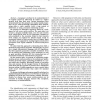120 search results - page 21 / 24 » Refactoring programs to secure information flows |
131
click to vote
SP
2010
IEEE
14 years 11 months ago
2010
IEEE
A program is defined to be noninterferent if its outputs cannot be influenced by inputs at a higher security level than their own. Various researchers have demonstrated how this pr...
107
click to vote
APLAS
2007
ACM
15 years 5 months ago
2007
ACM
We propose a series of type systems for the information-flow security of assembly code. These systems extend previous work TALC with some timing annotations and associated judgment...
133
click to vote
VEE
2012
ACM
13 years 9 months ago
2012
ACM
Dynamic data flow tracking (DFT) deals with tagging and tracking data of interest as they propagate during program execution. DFT has been repeatedly implemented by a variety of ...
108
click to vote
SIGSOFT
2004
ACM
16 years 2 months ago
2004
ACM
In this paper, we describe PSE (Postmortem Symbolic Evaluation), a static analysis algorithm that can be used by programmers to diagnose software failures. The algorithm requires ...
112
click to vote
ESORICS
2009
Springer
15 years 5 months ago
2009
Springer
Noninterference requires that public outputs of a program must be completely independent from secrets. While this ensures that secrets cannot be leaked, it is too restrictive for m...

